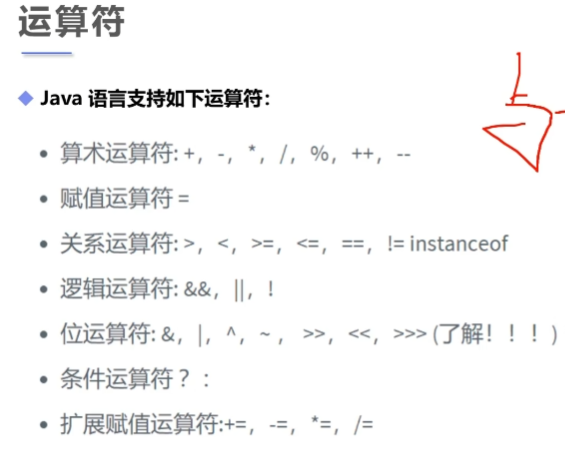变量是什么? 变量是可以变化得量
Java是一种强类型语言,每个变量都必须声明其类型.
Java变量是程序中最基本的存储单元,其要素包括变量名,变量类型和作用域
type varName [=value] [{,varName[=valueo]}]
//数据类型 变量名 = 值;可以使用逗号隔开来声明多个同类型变量
int a,b,c,d;
注意事项
public class Variable{
static int allClicks = 0; //类变量
String str = "hello world"; //实列变量
public void method(){
int i = 0; //局部变量
}
}
final 常量名 = 值;
final double PI = 3.14;
package base;
public class Demo7 {
//修饰符,不存在先后顺序,static和final得顺序没有关系
static final double PI = 3.14;
public static void main(String[] args) {
System.out.println(PI);
}
}
package base;
public class Demo6 {
//类变量 static
static double salary = 2500;
//属性:变量
int a,b,c,d;
//实列变量:从属于对象;如果不自动初始化,这个类型得默认值 0 0.0
//布尔值:默认值是false
//除了基本类型,其余得默认值都是null
String name;
int age;
//main方法
public static void main(String[] args) {
//局部变量:必须声明和初始化值
int i = 10;
System.out.println(i);
Demo6 demo06 = new Demo6();
System.out.println(demo06.age);
System.out.println(demo06.name);
//类变量 static
System.out.println(salary);
}
//其他方法
public void add(){
}
}

package test;
public class Demo1 {
public static void main(String[] args) {
//二元运算符
//Ctrl+D 复制当前行到下一行
int a = 10;
int b = 10;
int c = 10;
int d = 10;
}
}
package test;
public class Demo2 {
public static void main(String[] args) {
long a = 1216456465465L;
int b = 123;
short c = 10;
byte d = 8;
System.out.println(a+b+c+d); //long
System.out.println(b+c+d); //int
System.out.println(c+d); //int
//在整型运算中如果有Long类型得话,结果就是Long类型.不然都是int型
}
}
package test;
public class Demo3 {
public static void main(String[] args) {
//关系运算符返回结果: 正确,错误 布尔值
int a = 10;
int b = 20;
int c = 21;
System.out.println(c%a);
System.out.println(a>b);
System.out.println(a<b);
System.out.println(a==b);
System.out.println(a!=b);
}
}
package test;
public class Demo4 {
public static void main(String[] args) {
//++ -- 自增,自减 一元运算符
int a = 3;
int b = a++; //先给b赋值,再进行自增
// a = a + 1;
int c = ++a; //先自增,再给b赋值
System.out.println(a);
System.out.println(b);
System.out.println(c);
//幂运算 2^3 2*2*2 = 8
double pow = Math.pow(3,2);
System.out.println(pow);
}
}
package test;
public class Demo5 {
public static void main(String[] args) {
//与(and) 或(or) 非(取反)
boolean a = true;
boolean b = false;
System.out.println("a && b"+(a&&b)); //两个变量都为真,结果才为真
System.out.println("a || b"+(a||b)); //两个变量有一个为真,结果才为真
System.out.println("!(a && b)"+!(a&&b)); //如果是真,则变为假,则反之
//短路运算
int c = 5;
boolean d = (c<4)&&(c++<4); //如果前面得结果为假,则并不会执行后面得运算,直接返回假.
boolean e = (c>3)||(c>10); //如果前面得结果为真,则并不会执行后面得运算,直接返回为真
System.out.println(d);
System.out.println(c);
}
}
package test;
public class Demo6 {
public static void main(String[] args) {
/*
A = 0011 1100
B = 0000 1101
------------------
A&B = 0000 1100
A|B = 0011 1101
A^B = 0011 0001
~B = 1111 0010
2*8 = 16 2*2*2*2
效率高!!!
<< *2
>> /2
0000 0000 0
0000 0001 1
0000 0010 2
0000 0011 3
0000 0100 4
0000 1000 8
0001 0000 16
*/
System.out.println(2<<3);
}
}
package test;
public class Demo7 {
public static void main(String[] args) {
int a = 10;
int b = 20;
a+=b; //a = a+b;
a-=b; //a = a-b;
System.out.println(a);
//字符串连接符
System.out.println(""+a+b);
System.out.println(a+b+"");
}
}
package test;
public class Demo8 {
public static void main(String[] args) {
// x ? y : z
//如果 x == true , 则结果为y,否则结果为z
int score = 50;
String type = score < 60 ? "不及格":"及格"; //必须掌握
System.out.println(type);
}
}
原文:https://www.cnblogs.com/Avirus/p/15054021.html